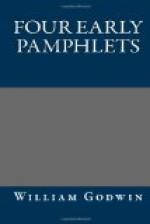I. With the New Companion to the London Kalendar.
II. With the Arms of all the Peers of England, Scotland, and Ireland.
III. With Rider’s Sheet Almanack or Book Almanack.
A dialogue on the actual state of parliament. Price 1s.
The Propriety of Retaining Gibraltar impartially considered. Price 1s.
An attempt to balance the income and expenditure of the state: With some Reflections on the Nature and Tendency of the late Political Struggles for Power. By John earl of Stair. Second Edition. Price 1s.
Thoughts on a reform in the Representation
of the People in the Commons
House of Parliament. Addressed to the Hon. William
Pitt. Price 1s. 6d.
Inscribed to the society for promoting constitutional information.
The nature and extent of Supreme power, in a Letter to the Rev. David Williams, (Author of Letters on Political Liberty) shewing the ultimate end of Human Power, and a free Government, under God; and in which Mr. Locke’s Theory of Government is examined and explained, contrary to the general construction of that great Writer’s particular sentiments on the Supremacy of the People. By M. Dawes, Esq. Price 1s.
INSTRUCTIONS
TO A
Statesman.
HUMBLY INSCRIBED TO
THE RIGHT HONOURABLE
George earl temple.
M.DCC.LXXXIV.
To the right honourable George earl temple.
My lord,
The following papers fell into my hands by one of those unaccountable accidents, so frequent in human life, but which in the relation appear almost incredible. I will not however trouble your lordship with the story. If they be worthy of the press, it is of no great consequence to the public how they found their way thither. If they afford your lordship a moment’s amusement, amidst the weightier cares incident to your rank and fortune, I have obtained my end.
I have endeavoured in vain to investigate who was their author, and to whom they were addressed. It should seem, from the internal evidence of the composition, that they were written by a person, who was originally of a low rank or a menial station, but who was distinguished by his lord for those abilities and talents, he imagined he discovered in him. I have learned, by a kind of vague tradition, upon which I can place little dependence, that the noble pupil was the owner of a magnificent chateau not a hundred miles from your lordship’s admired seat in the county of Buckingham. It is said




